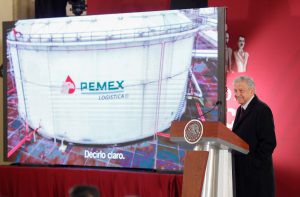
Mexico City, Jan 9 (EFE).- Mexico’s president appealed for calm Wednesday amid a growing fuel-scarcity problem in several states and this capital, saying that normal service will resume shortly.
“I urge citizens to remain calm and composed … we’re in the process of normalizing the supply,” Andres Manuel Lopez Obrador, known as AMLO, said in his daily press conference.
There is sufficient fuel to meet demand, according to AMLO, who said the supply problems stemmed from his government’s decision to distribute gasoline and diesel to service stations via tanker trucks instead of pipelines (a frequent target of fuel thieves).
Fuel shortages have occurred since last week in at least eight states, where motorists have been making panic purchases and waiting in hours-long lines to fill up their tanks, and the problem spread to Mexico City on Wednesday.
The president said the supply problems could be solved immediately by reopening government pipelines but that would mean “accepting and tolerating theft” and therefore urged the population to “resist.”
Stealing fuel from pipelines owned by state oil company Petroleos Mexicanos (Pemex) and re-selling it on the black market has become a major criminal enterprise in Mexico.
Theft of fuel from pipelines cost Mexico some $3.4 billion last year, the government says.
The amount of fuel robbed on Tuesday was equivalent to just 27 tanker trucks, AMLO said, adding that nearly 1,000 tanker trucks of fuel per day were being stolen before he took office on Dec. 1.
He added that a leak in a pipeline that runs from the central state of Hidalgo to Mexico City – where dozens of service stations were closed on Wednesday – had caused a drop in supply in the capital.
But he said that duct would be repaired on Thursday.
For his part, the head of Mexico’s Business Coordinating Council, Juan Pablo Castañon, said Wednesday that business leaders support efforts to tackle fuel theft but that the government must have an emergency plan in place for coping with the fuel shortages.
A long period of scarcity could lead to a crisis if no clear strategy is in place, he said in an interview with Milenio Television.
Castañon noted that the shortages not only were affecting people commuting to work but also the productive sector and the automotive industry in particular.
